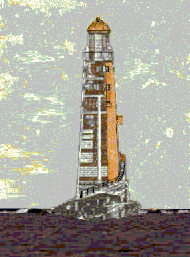1755 in science
The year 1755 in science and technology involved some significant events.
| |||
|---|---|---|---|
|
Astronomy
- Immanuel Kant develops the nebular hypothesis in his Universal Natural History and Theory of Heaven (Allgemeine Naturgeschichte und Theorie des Himmels).[1][2]
Chemistry
- Joseph Black describes his discovery of carbon dioxide ("fixed air") and magnesium in a paper to the Philosophical Society of Edinburgh.[3]

December 2: Fire burns second Eddystone Lighthouse, Rudyerd's wooden cone of 1709.
Earth sciences
- November 1 – An earthquake in Lisbon kills 30,000 inhabitants.
- Publication of De Litteraria expeditione per pontificiam ditionem ad dimetiendos duos meridiani gradus a PP, a description of the measurement of a meridian arc carried out in the Papal States by Ruđer Bošković with Christopher Maire in 1750–52.
Mathematics
- Leonhard Euler's Institutiones calculi differentialis is published.[4]
Technology
- December 2 – The second Eddystone Lighthouse (1709–1755), with a wooden cone, catches fire and burns to the ground; it will be rebuilt in stone.
- While serving as Postmaster General of the northern American colonies, Benjamin Franklin invents a simple odometer, attached to his horse carriage, to help analyze the best routes for delivering the mail.
- approx. date – Thomas Mudge invents the lever escapement for timepieces.
Awards
Births
- January 28 – Samuel Thomas von Sömmerring, Prussian physician, anatomist, paleontologist and inventor (died 1830).
- April 11 – James Parkinson, English surgeon (died 1824).
- June 15 – Antoine François, French chemist (died 1809)
- October 11 – Fausto Elhuyar, Spanish chemist (died 1833).
- October 28 – Jacques Labillardière, French naturalist (died 1834).
- Maria Elizabetha Jacson, English botanist (died 1829).
Deaths
- May 20 – Johann Georg Gmelin, botanist, natural historian and geographer (born 1709)
gollark: What? Unlikely.
gollark: Well, I would say it was stolen from GTech™ materials science research sites, except LyricLy couldn't actually do that and it's been out of "research" and into "multiversal deployment" for a while.
gollark: Greenland withdrew from the European Communities in 1985, the Inuit of Greenland.
gollark: Or not.
gollark: ++experimental_qa beeoid what is bee?
References
- Woolfson, Michael Mark (1993). "Solar System – its origin and evolution". Quarterly Journal of the Royal Astronomical Society. 34: 1–20. Bibcode:1993QJRAS..34....1W.
- Palmquist, Stephen (1987). "Kant's Cosmogony Re-Evaluated". Studies in History and Philosophy of Science. 18: 255–269. Bibcode:1987SHPS...18..255P. doi:10.1016/0039-3681(87)90021-5.
- Published 1756.
- Ball, W. W. Rouse (1888). A Short Account of the History of Mathematics. London: Macmillan. p. 368.
- "Copley Medal | British scientific award". Encyclopedia Britannica. Retrieved 21 July 2020.
This article is issued from Wikipedia. The text is licensed under Creative Commons - Attribution - Sharealike. Additional terms may apply for the media files.